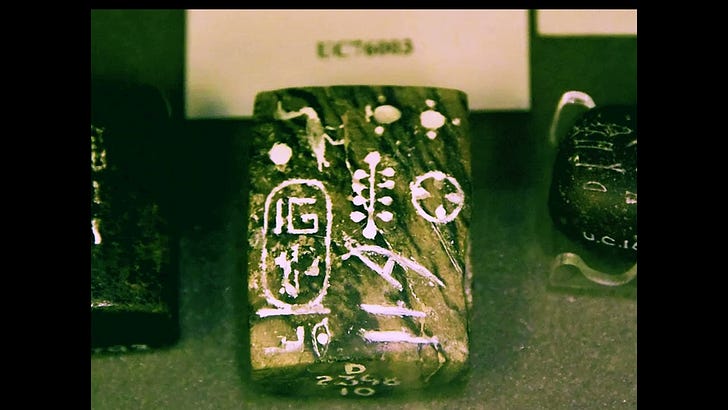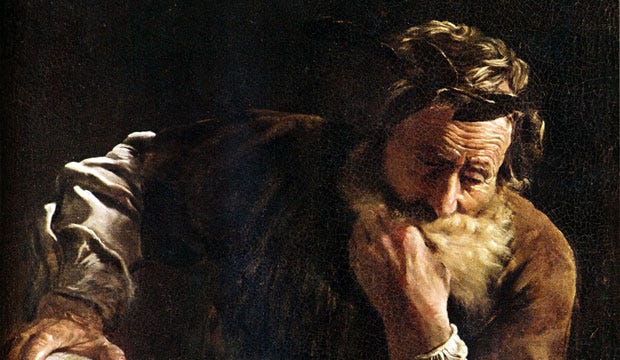Struck by a burning thirst for knowledge, a youth
Travelled through ancient Egyptian lands
—to Sais—to breach the secrets of its priests;
He eagerly made all the needed grades,
But still relentlessly kept climbing higher
—The hierophant could barely tame the boy.
“What good is one small part without the whole?”
Exclaimed the eager youth, without a pause.
“For, can the Truth be really more or less?
The way you speak of Truth is as if it
Were nothing more than a mere earthly sum,
As if a question of just more or less.
Surely, it’s something whole and without parts;
The Truth is pure and indivisible!
Remove one note and harmony dissolves,
Remove one color and the rainbow fades,
And nothing will be known, so long as that
One color, or one note, remains absent.
While the priest and the eager youth conversed,
They stood amid the precincts of a temple
Where a strange statue stood silent and veiled.
It captured the excited boy’s attention,
And so he turned towards the wise old priest
And asked, “What lies hidden beneath the veil?”
“Truth,” answered the old priest. “What!” said the boy,
“The Truth alone is all I care about,
And you would think of hiding it from me?”
“Only the Godhead can answer to that,”
Said the Egyptian priest. “And let no man
Reach for that veil,” he said, “Until I do;
For, he who with an impure hand removes
That mystic veil and sacred covering,
‘He’ said the Godhead, will behold the Truth.”
“How strange! And have you never tried to lift
The veil yourself, you who worship the Truth?”
“I never have, I never felt the need.”
“Could it be that only a thin veil stands
Between me and the Truth of things?” he asked.
“And a divine decree,” rejoined the old priest,
“The weight is heavier than you might think;
Though it may seem light to the hand—heavy—
So heavy can it weigh upon the mind.”
Lost in his thoughts, the youth made his way home,
But he now burned with a desire to know.
Restless, sleepless, tossing around in bed,
He rolled for hours, until at last the clock
Struck midnight and he rose, and quietly
Found himself drawn by a powerful force.
He climbed the walls, then after one more spring,
He found himself beneath the sacred dome.
Behold! The child in utter solitude,
Stood amid nothing but the deathly silence,
A silence broken only by the echo
Of every step he took across the vault.
And through the aperture of the high dome,
The quiet moon rained down her pallid beams
Just on the place where shining in the light,
The statue stood, concealed by its long veil.
The boy began to walk towards the form:
Hesitant, he moved his impious hand
Towards the statue, and then suddenly,
A chill ran down his spine; an unseen hand
Repulsed the boy, “What do you want,” echoed
A tortured voice within his shaken breast.
“Would you dare profane the Holiest One?”
“It’s true, declared the oracle, ‘Let none
Venture to raise the veil until I do.’
But did he not say Truth as well would rise?
Whatever it may be, I’ll raise the veil.”
And then he said, “I will behold the Truth!”
“Behold!”
His own words echoed back in mocking tone.
And with that word he cast the veil away.
What form his harrowed eyes met I don't know,
But when the warm, fresh morning's breeze returned,
The priests found a pale and unconscious boy
Lying before the pedestal of Isis.
He never shared what he had seen that night,
From that day on his happiness had fled;
Deep sorrow brought him to an early grave.
When pressed by questioners, he only said,
“Woe unto him, who comes to Truth through guilt:
Delight will forever be lost to him.”
Translation © David B. Gosselin
Discover more of Schiller’s works.
Profiles in Poetry: Friedrich Schiller
“Trust me, the fountain of youth, it is no fable. It is running Truly and always. You ask, where? In poetical art.” - Friedrich Schiller, The Fountain of Youth Friedrich Schiller was born on November 10th, 1759 in Marbach, Württemberg. He was without question one of the greatest poets and dramatists to have ever lived. While Schiller is not very well known…
From the Beautiful to the Sublime: On Schiller's "The Guides of Life"
Two kinds of genius may escort you throughout life.
Reflections on Ideal Science and Art: Schiller’s “Archimedes and the Student”
We’ll be publishing regular new translations and analysis for our subscribers, all of which will be appearing in my new book of Schiller translations. We begin this new year with reflections on the ideal of science and art, as explored in Schiller’s “Archimedes and the Student.”
Why We Need the Tragic: Schiller, Cassandra and the Rebirth of Tragedy
“Trust me, the fountain of youth, it is no fable. It is running









Thanks for the poem. It reminds me of early 2020, when the veil fell from the statue of government. That was deep sorrow!
We live in a culture where guilt is gilded with gold, while truth stands alone and neglected.